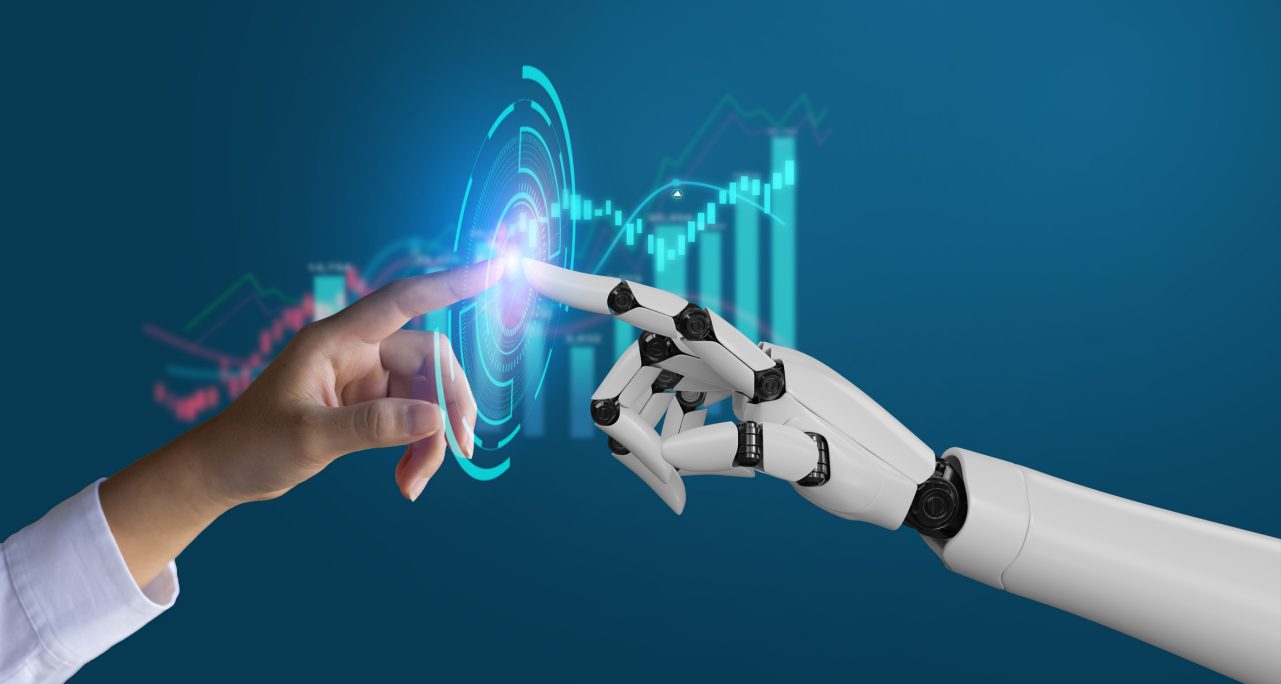We might generate income when you click links to our partners. Discover more.
What is synthetic basic intelligence (AGI), and why does it matter? As one of the most talked-about topics in technology today, it has actually sparked a race amongst top companies like OpenAI and Google to turn this advanced concept into reality. Understanding AGI is essential due to the fact that it has the potential to revamp markets, affect our society in profound ways, and change the way we interact with technology. Here's what you need to know about what it might be able to do, how it may transform markets and fields, and the substantial difficulties facing its advancement.
KEY TAKEAWAYS
• AGI differs from traditional AI in essential methods that it would have the ability to think, discover by itself, and adjust to new challenges like humans unlike traditional AI, which is designed for specialized jobs and runs within a restricted scope. It requires humans to update and fine-tune capabilities. (Jump to Section).
• Once it ends up being a reality, AGI would be able to make amazing advances in several fields, consisting of healthcare, akropolistravel.com research study, and financing sectors. (Jump to Section).
• Creating AGI is hard due to the research study challenges that include technical, ethical, and social problems. Addressing these difficulties is central to maintaining the safe and favorable development of this innovation. (Jump to Section)

Featured Partners: Artificial Intelligence Software
Learn More
TABULATION
What is Artificial General Intelligence (AGI): A Clear Definition.
Understanding AGI vs Traditional AI.
Potential Applications of Artificial General Intelligence.
Challenges in Artificial General Intelligence Research.
3 Introductory AGI Courses to Consider.
Frequently Asked Questions (FAQs).
Bottom Line: Why Knowing What Is Artificial General Intelligence Matters.
What is Artificial General Intelligence (AGI): A Clear Definition
Artificial general intelligence, or AGI, refers to a type of expert system (AI) that can interpret, learn, and trade-britanica.trade carry out any cognitive job that a human can do. Unlike today's AI, which is built to deal with specific jobs like suggesting items or processing data, AGI would have the ability to adapt to new difficulties and use understanding throughout various fields. Simply put, this sophisticated type of AI would believe and reason like a human. While AGI holds excellent potential, it deserves noting that it is still a principle today, without any totally developed systems offered yet.

Key Capabilities of Artificial General Intelligence
AGI would have a series of capabilities that simulate human intellectual functions, so it can carry out jobs beyond the narrow focus of the existing AI tools in the market. Some essential abilities include the following:
Human-Like Reasoning: The technology would be able to understand and make choices the way humans do. It would believe seriously, solve problems, and create solutions based upon its own experiences and past interactions, comparable to how we use past understanding to new scenarios.
Solving Unfamiliar Problems: One of AGI's strengths is its prospective to tackle brand-new issues. Unlike traditional AI, which is trained to perform specific tasks, AGI would have the capability to handle problems it hasn't been directly trained to solve. It could find out how to approach a completely brand-new challenge, simply like humans do when confronted with something we've never ever experienced before.
Self-Learning and Adapting: AGI could tweak its skills and learn from experience, without the need to be manually updated each time. It would observe and evaluate information, learn from errors, and find much better ways to finish tasks in time. This implies AGI might adapt to brand-new scenarios and get much better at jobs by itself.
Using Knowledge Across Different Areas: AGI would be able to take what it learns in one location and use it to other tasks. For example, if it learned how to fix mathematics problems, it could utilize that knowledge to resolve difficulties in other fields, like science or business. The ability to transfer abilities throughout different areas is something people do naturally and would make the innovation versatile in varied sectors.
Understanding and Responding to Emotions: Recognizing and reacting to human feelings would likewise be within AGI's capabilities. This would be necessary in settings where comprehending people's sensations matters, such as healthcare, client service, or social circumstances. By responding to emotions appropriately, AGI would be better equipped to deal with human beings in an efficient method.
Understanding AGI vs Traditional AI
The table listed below supplies a picture of the major distinctions in between AI and conventional or narrow AI by highlighting their abilities, flexibility, and existing status.
AGI would have the capability to think, find out autonomously, and adapt to new difficulties like human beings. However, it is still theoretical and has actually not been realized yet. On the other hand, conventional AI is constructed for particular jobs and operates within a repaired scope. It can not adjust to new jobs without human input.
For example, an AGI could learn to detect medical conditions, then utilize that knowledge to establish individualized treatment plans-and even change its approach based upon the patient's progress. Additionally, it might use this problem-solving ability to tasks in entirely various fields, such as producing business techniques or encouraging on environmental conservation. On the other hand, traditional AI, like a diagnostic tool, can just evaluate medical information for specific conditions. It can not adjust to other locations or enhance on its own.
Potential Applications of Artificial General Intelligence
While AGI isn't here yet, its possible applications span numerous fields and hold great guarantee of extreme developments in numerous sectors. Without being restricted to specific tasks like narrow AI, AGI would be extremely flexible and could use its abilities to solve multi-disciplinary issues. It could get rid of obstacles presently beyond the abilities of existing AI applications.
Transforming Healthcare
AGI would change the game in healthcare by detecting complex and rare illness with greater precision, even in cases where signs are uncertain or overlap with several conditions. It could develop highly tailored treatment strategies by studying patient history, genetic information, and real-time health data. In addition, AGI could accelerate drug discovery, recognizing possible treatments in weeks rather than years by processing massive datasets and running predictive simulations.
Advancing Scientific Research
In clinical research, AGI would be able to mimic experiments, analyze detailed datasets, and generate hypotheses. It could accelerate advancements in quantum physics, genomics, and climate science. By integrating understanding from numerous domains, the technology might reveal connections and services that may otherwise go undetected by conventional AI.
Improving Industry
Organizations in the commercial field could utilize AGI to improve effectiveness in real-time by managing whole supply chains. It would forecast and resolve disturbances before they happen. In manufacturing, it might oversee autonomous factories, enhancing production processes while preserving security and quality requirements. Its capability to adjust to changing circumstances would make it an important tool in industrial environments.
Enhancing Business Strategy
AGI could improve service decision-making by assessing market patterns, consumer behavior, and operational information to find opportunities and dangers. In contrast to narrow AI systems, AGI would innovate options to tough business problems, such as handling economic unpredictability or forecasting long-term market shifts. Its capability to gain from varied sources would empower businesses to stay competitive.
Redefining Finance
In the monetary sector, AGI could increase forecasting accuracy by discovering patterns in large quantities of monetary information, so investors and organizations can make informed choices. It would likewise have the ability to find fraud in real-time by acknowledging subtle anomalies that traditional AI systems may miss. Additionally, AGI could build more robust financial designs, considering complicated variables and situations to alleviate risks.
Challenges in Artificial General Intelligence Research
Developing AGI is among the most ambitious goals in technology, but it comes with numerous difficulties. These obstacles consist of technical, ethical, and social locations, making AGI development a complex and multi-faceted process. Overcoming the following obstacles amounts ensuring safety, maintaining ethical standards, and carefully preparing how AGI's introduction and use will affect individuals, industries, and society as a whole:
Making AGI Truly Flexible: AGI would need to handle a vast array of problems and adjust to brand-new situations, similar to people. Building a system of flexibility is incredibly difficult due to the fact that existing AI tools are not developed to believe or learn at this level of sophistication.
Massive Computing Needs: To replicate human intelligence, AGI would require enormous quantities of computing power to procedure information from diverse sources rapidly. Finding out how to make such systems powerful and efficient enough for real-world usage is a considerable challenge.
Understanding Human Intelligence: We do not completely comprehend how human believing works, specifically complicated elements like intuition or awareness. Without this understanding, it's challenging to develop machines that can emulate human-like thinking.
Making AGI Safe and Ethical: AGI could possibly be misused, like to develop prejudiced systems or damaging tools like autonomous weapons. Researchers should make sure that AG is constructed responsibly and follows strict ethical guidelines. This is a tricky job that demands global cooperation.
Keeping It Under Control: There's a risk AGI might act in ways we do not expect, specifically because it would have the capability to discover and change with time. Ensuring that these systems remain lined up with human values and are safe to use is one of the greatest difficulties in AGI research.
Influence on Jobs and Society: If AGI becomes a reality, it might replace jobs or trigger economic inequality by benefitting some groups more than others. Preparing for these social impacts is just as crucial as developing the innovation itself.
High Costs and Resources: Researching AGI requires a lot of cash, time, and expert knowledge. Not all organizations have these resources, slowing down progress and leaving smaller services out of the race.
3 Introductory AGI Courses to Consider
Familiarizing yourself with AGI can give you a competitive edge, whether you want to advance your profession in AI or simply desire to stay informed about emerging technologies. The following initial courses can help you get a much deeper understanding of what artificial general intelligence is, so you can solidify your knowledge about this appealing AI advancement.
Artificial General Intelligence (AGI): An Initial Course on Udemy
This Udemy course offers a fundamental understanding of AGI, ideal for newbies with no previous experience. The course covers pertinent subjects, consisting of the structures of AI, the basics of AGI, and the newest patterns in the field. It also explores the benefits, dangers, and difficulties related to AGI, equipping you with insights into what the innovative innovation can achieve. The entire course includes 15 lectures and can be finished in around 45 minutes. Upon completion, you will receive a certificate to boost your qualifications in the task market. This initial course costs $24.99.
Intro to Artificial General Intelligence (AGI): Future of AI on Udemy
Udemy's initial course provides a thorough introduction of AGI for students without any technical background. It discusses the historic context and foundation of AGI, the differences between narrow AI and AGI, and ethical factors to consider surrounding its advancement. In addition, it attends to future patterns in AI and AGI, shedding light on the obstacles and opportunities that lie ahead. Spanning one hour and 46 minutes, the course consists of 39 lectures, on-demand video, and downloadable resources. It likewise has a practical test at the end to enhance your understanding. You will be awarded a certificate once you finish the course. It is available as part of Udemy's premium plans, beginning at $20 each month, or as a separate purchase of $49.99.
Artificial General Intelligence (AGI) on Udemy

This Udemy course brings a clear and concise introduction to the subject, with on-demand videos and 22 lectures. It elaborates on significant AGI ideas and the function of robotics in AGI advancement. It likewise analyzes the ethical, software application, and hardware difficulties in developing AGI. The course supplies quizzes to evaluate your knowledge and a certificate of conclusion. Priced at $44.99, it is produced students at any level, making it available and important for anyone who desires to find out more about AGI.
Frequently Asked Questions (FAQs)
Achieving AGI could revolutionize industries, enhance decision-making, and lead to considerable improvements in innovation. However, it also raises concerns about principles, task displacement, and the need for correct guideline to make certain it is developed safely and responsibly.
Experts disagree on how far we are from achieving AGI. Sam Altlman of OpenAI thinks in 2025, AI representatives might join the workforce, ultimately leading the way to AGI advancement. On the other hand, a survey of AI scientists puts the mean price quote around 2047. Despite rapid AI advancements, existing systems are still restricted to narrow tasks and lack the broad, versatile thinking of humans-so AGI is likely still decades away.
The concept of AGI totally replacing people is still debated. Even though it's likely that AGI will help us by taking over repeated jobs, there is a possibility that it might displace specific tasks. That stated, instead of completely replacing humans, AGI is expected to work along with us, handling technical responsibilities while we focus on jobs that need creativity and compassion. At the end of the day, the impacts of AGI will depend on how society selects to manage and incorporate it.
Bottom Line: Why Knowing What Is Artificial General Intelligence Matters
Understanding artificial general intelligence is crucial due to the fact that this innovation might alter industries, solve tough problems, and transform how we use AI. But as we start to develop AGI, we need to carefully address several challenges, including technical issues, ethical concerns, and its general effect on society. By finding out about AGI's potential and risks, we can work towards making certain it is developed responsibly and used in methods that would benefit everybody.









